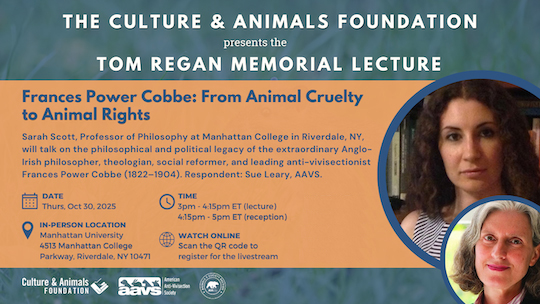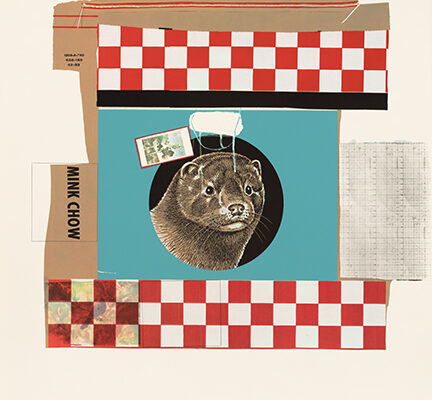In addition to Sarah Scott, CAF and NCSU chose Kaitlyn Kitchen as a 2024 Regan Research Fellow. Kaitlyn was then a rising senior at Appalachian State University, where they were majoring in Women’s, Gender, and Sexuality Studies with a minor in Philosophy. Their thesis project considered the potential limitations of animal rights organizations from feminist and anti-racist perspectives, with a strong consideration for the positive impacts of these groups. At the Archives at NCSU Kaitlyn focused on how animal rights organizations used gendered appeals as a form of advocacy, such as sentimental fiction in the nineteenth century and sexualized billboards of vegan celebrity women in the twentieth century.
In his text The Case for Animal Rights, Tom Regan wrote, “Those involved in the animal rights movement are partners in the struggle to secure respect for human rights—the rights of women, for example, or minorities, or workers. The animal rights movement is cut from the same moral cloth as these.” Although Regan was not known to be a feminist philosopher, Kaitlyn takes this as his acknowledgment of the fundamental interconnectedness of the animal rights movement and other movements that seek to end differing systems of oppression.
“When one system of oppression is granted the environment to exist, this creates space for other oppressions to endure,” Kaitlyn says. “In order to end oppression, you must eliminate all oppressive structures. It is easy to connect other systems of oppression that impact humans to the oppressive systems that disenfranchise non-human animals.”
Kaitlyn reviewed Tom Regan’s archived correspondence regarding “Feminism and Vivisection” and the journal Feminists for Animal Rights in order to develop a feminist reading of Regan’s work. They also looked at other thinkers throughout the collection, as well as the archives of Feminists for Animal Rights, to understand the relationship between animal rights thinkers and gender. Additionally, Kaitlyn explored the Animal Rights and Animal Welfare pamphlets and the Betty B. Eilers Collection—which houses multiple scrapbooks that include animal rights pamphlets, the minutes of animal rights group meetings, and information about animal rights groups—to glean a historical perspective of animal rights and to assess the way that activism has become gendered due to the emotional appeals used to support their points.
Kaitlyn sees a contemporary example of such gendering of activism in PETA campaigns. “PETA often utilizes scantily clad women who pose in a sensual manner,” they say. “An example with Pamela Anderson was the ‘All Animals Have the Same Parts’ movement. The image details Anderson naked with markings throughout her body that reflect the mirroring portions that would be sold as meat if they were on a non-human animal.”
“I am excited to see as much as I can see in this archive,” Kaitlyn says. “Researching online is valuable—however, there is a significant amount of historical information in these archives that I cannot find elsewhere. Developing my ideas through the archive would provide deeper insight into an analysis on animal rights movements.”
Kaitlyn talked about her work in the archive in a webinar in 2025.




